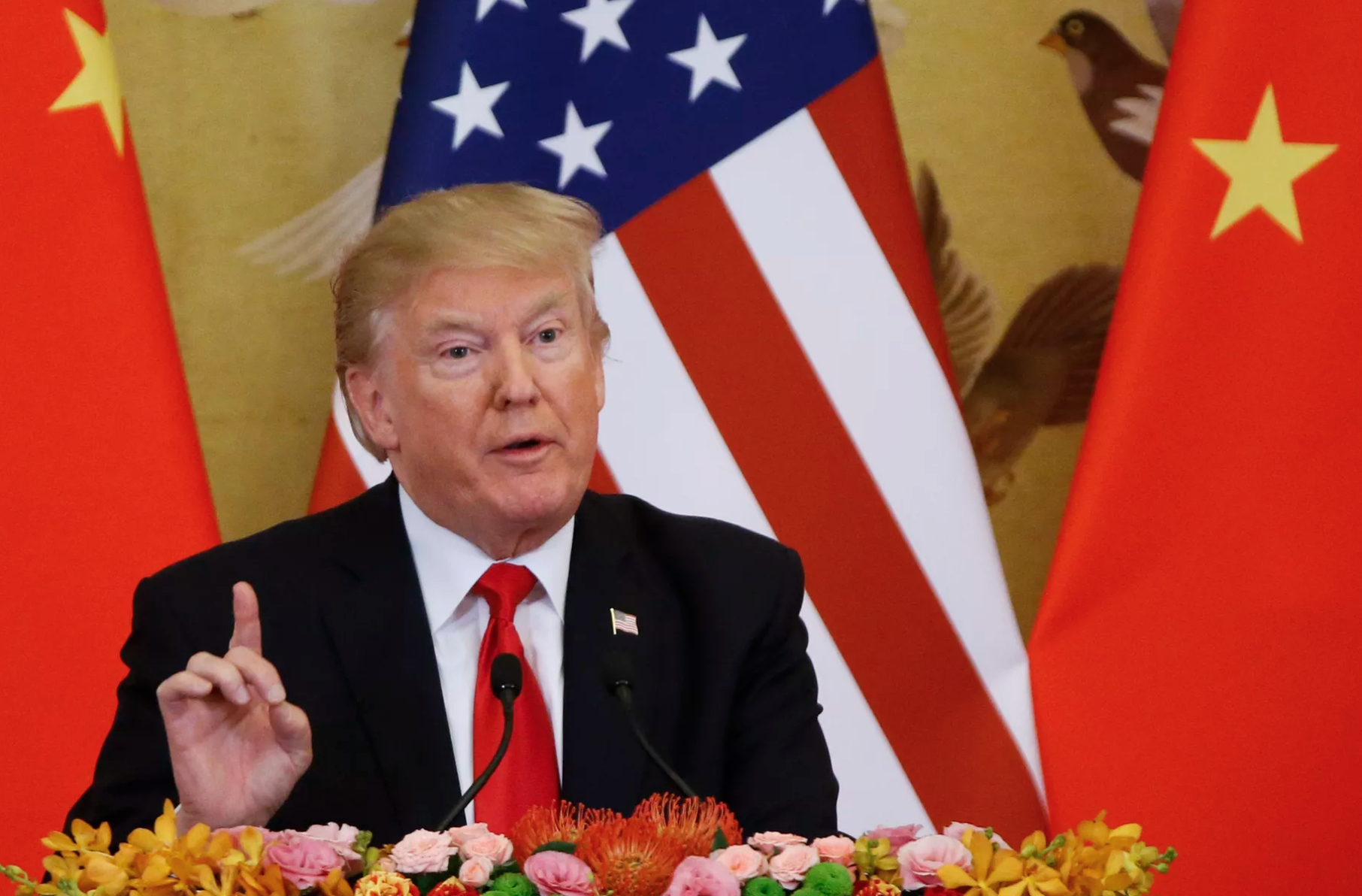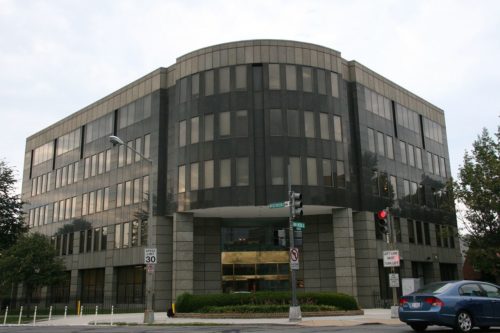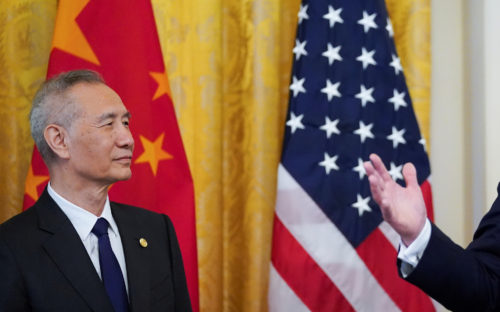Trade war, day 145: Trump talks up his tariffs

The already low expectations for any resolution of the U.S.-China trade crisis when Trump and Xi meet in Buenos Aires later this week just got lower. In an interview with the Wall Street Journal (paywall), the American president expressed a high level of satisfaction with his tariffs on Chinese goods.
- Trump said it was “highly unlikely” that the U.S. would hold off on raising import levies from the current 10 percent to 25 percent on January 1, and indicated that he would be willing to extend tariffs to all imports from China:
I am very happy with what’s going on right now. We’ve only used a small portion of what we have to use because I have another $267 billion [in imports] to go if I want, and then I’m also able to raise interest [Ed: he meant tariff] rates. And we have money that is pouring right now, pouring…
The only deal that would really be acceptable to me — other than obviously we have to do something on the theft of intellectual property, right — but the only deal would be China has to open up their country to competition from the United States…. Otherwise, I don’t see a deal being made. And if it’s not made, we will be taking in billions and billions of dollars.
- Markets reacted negatively to the news, with Apple shares in particular taking a hit at the prospect of tariffs on more of its products made in China. The SCMP notes: “Tariffs imposed in September had spared the iPhone, which generates half of the company’s sales, but affected product lines such as Apple accessories and the Mac Mini.”
China talks back:
- Responding to Trump’s comments, Chinese foreign ministry spokesman Gěng Shuǎng 耿爽 said, “The Chinese side is willing to resolve the trade issues [with the US] through serious dialogue that is based on the principles of equality and integrity…. But we will also resolutely defend our interests [during the talks].”
- Xiè Fúzhān 谢伏瞻, president of the Chinese Academy of Social Sciences, refuted Trump’s insistence that China unfairly benefits from its WTO classification as a developing country and that it should be treated as a developed nation, stating, “Such doubts come partly from the shortage of knowledge of China, and partly from some countries advancing their own interests.”
- Vice Minister of Science and Technology Xú Nánpíng 徐南平 said that China will thrive despite U.S. technology export restrictions: “China has been developing at the medium-to-low end in the global industrial chain…. If the US decides not to export technology to China, China will be forced to grow its edge at the medium-to-high end.”
Other trade-war-related news:
- Automakers feel the heat
GM warned Trump that his China tariffs would hurt jobs. He now complains that it’s happening. / Insider
“Earlier this year, GM lowered its profit forecasts for 2018, citing higher steel and aluminum prices caused by new US tariffs. And in June, GM warned that trade tariffs could lead to job losses and lower wages, telling the Commerce Department that higher steel tariffs would affect competitiveness.”
Donald Trump asks General Motors to stop making cars in China / Reuters
Tesla sales in China plunge 70 percent in October, according to auto industry body / CNBC
“An official from China Passenger Car Association said data from the industry body showed Tesla sold just 211 cars in the world’s largest auto market in October.”
Tesla shares slip after report says China sales sank 70% in October / CNBC
Tesla says reported sales fall in China ‘wildly inaccurate’/ Global Times
“While we do not disclose regional or monthly sales numbers, these figures are off by a significant margin,” Tesla senior communications manager Cheryl Zhang told the Global Times.
- The North Korea factor
Xi-Trump at G20: Why North Korea is both common ground and trade war battleground / SCMP
“Zhao Tong, a fellow with the nuclear policy programme at the Carnegie-Tsinghua Centre for Global Policy in Beijing, said the ongoing trade war was presenting China serious challenges that might have affected its decision to accommodate the US, an outcome that could be repeated in Buenos Aires. ‘It cannot be ruled out that China may decide to cooperate more closely with the United States on North Korea to get Washington to stop the trade war,’ Zhao said.”
- The big picture on trade and U.S.-China relations
Chinese views on the state of the Sino-U.S. relationship in 2018 / Carnegie Endowment for International Peace
“This article takes a close look at Chinese views toward the Sino-U.S. relationship since May to see if there are signs that such a change is actually occurring and if not, what the lines of Chinese debate might be over the state of current and future relations.” On Twitter, author Michael D. Swaine concludes that Beijing “needs to drop its ‘I’ve done nothing wrong’ pose and start correcting its mistakes and misjudgments.”
The deal America and China need / WSJ (paywall)
Thomas J. Duesterberg of the conservative Hudson Institute stated that “as the two presidents prepare to meet Friday in Buenos Aires, it would be a mistake for American negotiators to imagine that tariff measures and more commodity purchases will be enough to secure a worthwhile deal with Beijing. The real threat from China is much deeper than anything reflected in the bilateral balance-of-payments ledger.”
There is no grand bargain with China / Foreign Affairs (paywall)
“Any agreement in Argentina will be a tactical pause at best, providing short-term relief to jittery stock markets and beleaguered U.S. farmers, but having no material or long-lasting effect on the slide toward a high-stakes geopolitical competition between the United States and China. The days when the world’s two largest economies could meet each other halfway have gone.”
Will China return to isolationism? / The Diplomat
“Some in the West, mainly the United States, assert that engagement with China has failed, but comparing the current situation in China with four decades ago, one can say that the engagement policy has no doubt been successful. The greatest danger now is that the West, ignoring the success of its engagement policy, throws away the carrot and picks up the stick instead.”
- Chinese consumers
China’s ‘consumption upgrade’ trend undeterred by US-China trade war, study says / SCMP
“According to a joint study by global consultancy Bain & Co and market research firm Kantar Worldpanel, spending by Chinese households on fast-moving consumer goods (FMCG) is expected to rise 5 percent in 2018 on year.”
China must give consumers confidence to spend as trade war rages / SCMP
“China’s consumers are being hamstrung by flagging confidence, a less robust housing market, falling stock market prices, soft car sales, indifferent employment conditions and an extremely weak yuan. The growing uncertainty has hit retail spending sentiment pretty hard as consumers have fretted about the weaker economic picture.”
- Tech success in Taiwan
Taiwan’s underdog city Taoyuan is reborn in China-US trade spat / Bloomberg via Straits Times
“The former Japanese enclave west of Taipei had long suffered as local companies shifted factories to the Chinese mainland to benefit from lower wages and globalizing trade. But with tensions escalating between the world’s two largest economies, Taiwan’s biggest tech firms are now moving some production back home and many are turning to this city of two million on the northwestern coast.” - Bad news for American farmers
Farm bankruptcies on the rise in Upper Midwest / AP
“The number of farms filing for bankruptcy is increasing across the Upper Midwest, following low prices for corn, soybeans, milk and beef, according to a new analysis from the Federal Reserve Bank of Minneapolis.”
Crop drop: China swine fever outbreak to curb its soybean imports / Reuters
“China’s imports of soybeans are set to drop as an outbreak of African swine fever hits its huge pig herd and saps demand for the animal feed ingredient, making it easier for buyers to keep shunning U.S. cargoes amid the Sino-U.S. trade war.” - Chinese industry
China’s industry profit growth slows for 6th month as trade war takes toll / SCMP
“China’s industrial profit growth decelerated for a sixth straight month in October, as the trade war with the United States continued to weigh on the economy. Industrial profits rose 3.6 percent last month compared to a year earlier, down from growth of 4.1 percent in September and the recent high of 21.9 percent growth in April, according to data from the National Bureau of Statistics.”
Party’s over: As margins tumble, China steel mills brace for hard times / The Star Online
“Chinese steel producers ran up losses for the first time in three years this month as prices slid into a bear market on weak demand and near-record supply, ending years of solid profit margins.”
Bulk commodities under pressure as China steel prices plunge / FT (paywall)
Previously in The China Project’s trade war coverage:
U.S. efforts to control advanced technology hitting new levels, directed squarely at China





